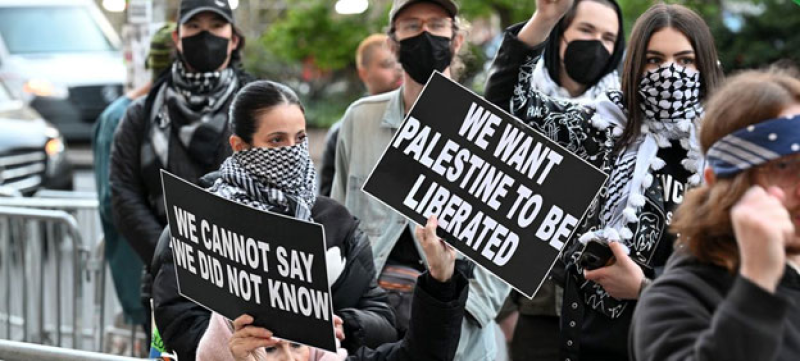- JICA, Milestone School sports festival to support students’ emotional recovery |
- Bangladesh gold market breaks record as prices hit Tk 2.57 lakh per bhori |
- Joint forces' drive for 'silent zone' around Airport: 94 cases filed |
- Al-Arafah Islami Bank to suspend all services for 9 days starting Jan 30 |
- Bangladesh GDP to Grow 5% in 2026 Amid Rising Price Pressures |
Western Support for Israel Faces Growing Strains

Protesters demonstrate outside the Columbia University campus in New York City. October 2024.
When the high-level meeting of over 150 world leaders takes place at the United Nations from 22–30 September, one of the political highlights will be the announcement by at least 10 Western nations of their decision to recognise Palestine as a sovereign state.
The 10 countries – some of which have already declared their recognition ahead of the UN meeting – include the UK, France, Canada, Australia, Portugal, Malta, Belgium, Spain, Ireland and Norway, signalling that longstanding Western support for Israel is gradually diminishing.
According to CNN, Israel’s Foreign Ministry has “rejected” the European nations’ calls for recognition, describing it as a “reward to Hamas” that undermines efforts to reach a ceasefire. US President Donald Trump also condemned the move.
The United States, a steadfast supporter of Israel, is expected to exercise its veto in the Security Council against any attempts to recognise Palestine as “a full-fledged member of the United Nations.”
So far, Palestine has been recognised as a sovereign state by 147 of the UN’s 193 member states, representing just over 76% of the membership. Since November 2012, it has held the status of “non-member observer state” in the General Assembly.
Meanwhile, US Secretary of State Marco Rubio told the New York Times: “We told all these (European) countries, if you do this recognition stuff, it’s fake. If you do it, you are going to create problems. There’s going to be a response.”
In a counter-move, the Trump administration revoked US visas for all Palestinian delegates scheduled to address the General Assembly next week. As a result, there were discussions about relocating at least one session to Geneva – as in 1974 when Yasser Arafat was denied a US visa – or allowing Palestinian participation remotely.
Asked for an update, UN Spokesperson Stephane Dujarric said: “We’re in touch with the State Department to try to get some clarification, and hopefully a reversal of the decision based on their obligations under the [US-UN Headquarters] Agreement.”
When asked if the General Assembly’s high-level week might be held outside the US, Dujarric responded: “No. I’ve not seen any credible movement on that. Member States can decide to hold a meeting wherever they choose, but frankly, I have not seen any serious traction on that.”
Dr Alon Ben-Meir, a retired professor of international relations at New York University, said the role of European countries in supporting Palestinian independence cannot be overstated. He argued that support must go beyond symbolism and focus on practical measures such as:
Providing direct economic support to Palestinian institutions and infrastructure, with accountability.
Establishing bilateral trade agreements to strengthen the Palestinian economy independently of Israel.
Pushing for enhanced observer status and participation of Palestine in international bodies, while supporting legal avenues for rights.
Upgrading Palestinian consulate offices in their capitals to higher diplomatic status.
Funding public diplomacy campaigns to build support for Palestinian statehood.
Offering training and support for Palestinian security forces in coordination with Israel.
Dr James Jennings, President of Conscience International, cautioned that while European recognition may draw attention, it will not alter realities on the ground. He questioned the sincerity of the move, noting that some of these same countries supply Israel with weapons used against Palestinians.
He stressed that despite widespread diplomatic recognition, Palestine still lacks genuine sovereignty. “At this point, Palestine is just an idea, a group of people with a flag, and a limited political apparatus. But their strong group identity means that no matter what happens, they will remain in their land,” he said.
The long-discussed Two-State Solution is now viewed by many as dead, given decades of occupation and the growth of Israeli settlements inside the 1967 Green Line.
While recognition by European nations may focus attention on Palestinian statelessness, Dr Jennings argued it will not replace the need to challenge Israel’s dominance. He added: “So far, Israel has refused even to define its own borders. The Knesset, under Likud, is poised to seize and nationalise all Palestinian territory, meaning there cannot be two states, only one: Israel.”
Dr Ben-Meir agreed, saying recognition alone remains symbolic unless backed by significant measures to overcome four major obstacles: Israeli resistance backed by the US, weak Palestinian governance, inconsistent Arab support, and lack of follow-through from recognising states.
“To realistically pave the way to Palestinian statehood, all players involved must take momentous steps and remain committed, even though Israel will resist and rely on the US to block such an outcome,” he concluded.

